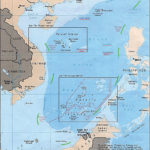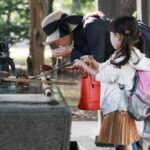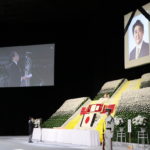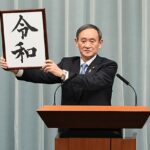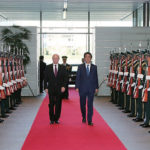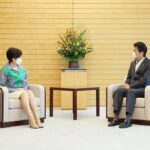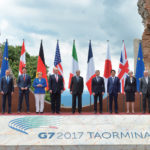Keio University Associate Professor Atsuhito Isozaki comments on the US-North Korea deadlock and the prospects for a Japan-North Korea diplomatic thaw.
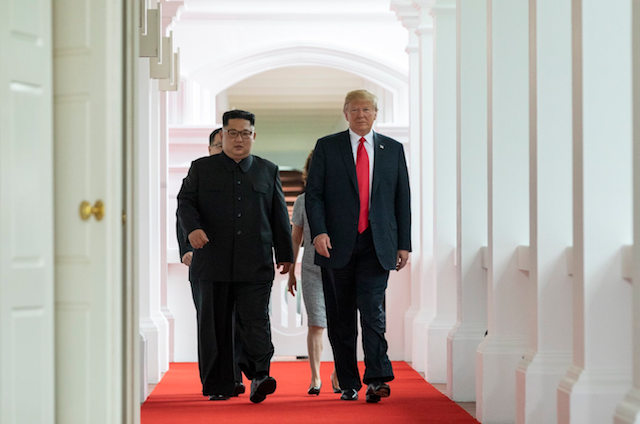
North Korea leader Kim Jong-un and President of the United States Donald Trump walk to the summit room in Singapore, June 12, 2018.
US GOVERNMENT PHOTO, PUBLIC DOMAIN
On July 27, North Korea transferred to the United States what are thought to be the remains of fifty-five American soldiers killed in the Korean War, the date being the 65th anniversary of the armistice agreement that ended the fighting. The return of the remains partially fulfills one part of the agreement reached between the United States and North Korea at the summit meeting on June 12. The US State Department has disclosed that “North Korea did not ask for money and no money was exchanged” for expenses associated with the repatriation of the remains.
What North Korea wants from the United States is not money but security guarantees. The United States used armed force to overthrow the Taliban regime in Afghanistan and the Hussein regime in Iraq. And having waged war with the United States itself for a full three years (1950–53), North Korea perceives the nation as a threat as a matter of course, and has single-mindedly set out to develop nuclear weapons and missiles as a deterrent. However, North Korea’s ambition to possess nuclear weapons has had the effect of amplifying the American threat, while its nuclear and missile development program even finally persuaded China to join the international sanctions against it last year.
The realization and execution of both the “complete denuclearization” and “security guarantees” agreed upon during the historic US-North Korea summit appear to have come to a standstill. It is understandable that many are suspicious of North Korea’s commitment considering past events. Nevertheless, I am certain that Chairman Kim Jong-un went to the summit meeting with US President Donald Trump prepared to implement “complete denuclearization.” If Kim had simply wanted to avoid a clash with the United States, his talks with South Korea’s President Moon Jae-in in April and May would have sufficed. If his actions were to be perceived as “stalling,” this would not only risk causing the distrust of President Trump as well as that of future US administrations, but would also risk angering China’s President Xi Jinping, who has met Kim three times and, furthermore, lent him a Chinese civil airline private jet for the meeting with President Trump.
If North Korea is indeed prepared for “complete denuclearization,” whether or not it is realized is up to the United States. Firstly, the question is whether President Trump will remain committed without making easy concessions to North Korea. Nothing would make North Korea happier than gaining “security guarantees” in the form of diplomatic normalization in exchange for giving up its ICBMs or transporting some of its nuclear warheads abroad. Secondly, will the United States be willing to accommodate a step-by-step solution based on “simultaneous action”? It is crucial that the United States alleviate North Korea’s deep-seated distrust and negotiate while at the same time building trust. We feel some unease about this because President Trump’s actions are unpredictable and lack an obvious strategy.
While North Korea has not obtained any concrete results in the form of an agreement to lift economic sanctions or for the signing of a peace treaty, the nation is steadily gaining small advantages.
First of all, once berated as “little rocket man,” Chairman Kim has successfully demonstrated to the world that he is in fact a strategic thinker and an individual with whom dialogue is possible. Moreover, North Korea’s chilled relations with China have improved suddenly. Direct flights between the two countries are now full with passengers, a stark contrast with seat occupancy at the end of last year, which was around 10%. Interactions between North Korea and China have become livelier on all levels. The North Korea-run restaurant in Beijing has been filled with South Korean customers since spring this year. Economic sanctions are in reality being reduced little by little and a potential solution is revealing itself.
Meanwhile Japanese Prime Minister Abe Shinzo has had to modify his commitment to pressure on North Korea. He has started exploring the possibility of dialogue with North Korea by emphasizing the importance of the Japan–North Korea Pyongyang Declaration, which promises a path to diplomatic normalization.
However, North Korea’s distrust of Abe is extraordinary. It is North Korea’s view that it was Abe who canceled the 2002 Japan-North Korea Pyongyang Declaration and who then rose to the position of prime minister by harshly criticizing North Korea. As the Kim Jong-un regime was shifting its focus from the military to the economy in the fall of last year, Abe was campaigning in the general election, calling the North Korea issue a “national crisis,” and subsequently won by a large margin. The suspicion is that Abe’s calls for dialogue now are another attempt to increase his approval rating at home. In order to resolve the issues with North Korea, not only must Japan ask for North Korean sincerity, but the Abe administration must itself also act with sincerity.
In this way, North Korea is pushing even the hardline Abe administration to enter into dialogue, but it is the responsibility of all of North Korea’s neighbors to continue to remind Pyongyang that North Korea cannot obtain its desired “security guarantees” without “complete denuclearization.” To build a consensus that peace and stability in Northeast Asia is something positive among not only Japan, the United States and South Korea, but also China, Russia and even North Korea, there is a need for tenacious dialogue, regardless of potential complications. Each country must make efforts to understand the others’ points of view, even when their way of reasoning is very different. Easy concessions to North Korea must be avoided, but any sincerity shown by Pyongyang should be repaid in kind.
ISOZAKI Atsuhito is an associate professor in the Faculty of Law at Keio University. His research focuses on contemporary North Korean politics and Japan-North Korea relations.

